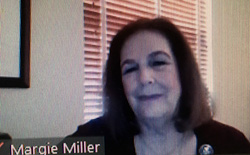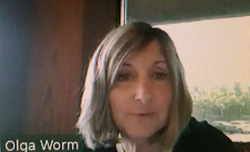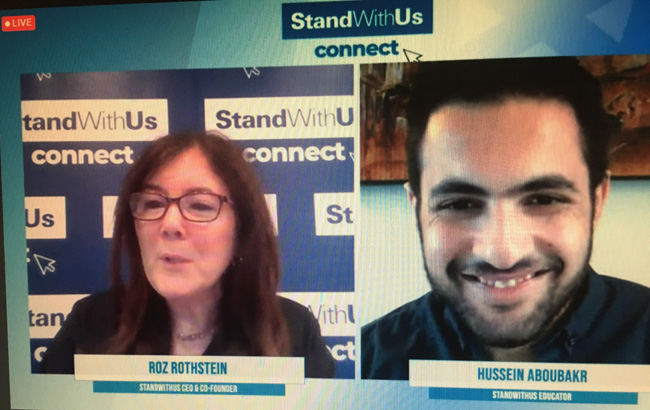
Other items in today’s column include
*Egyptian Muslim who became a Zionist tells of his turnaround
*San Diego Union-Tribune survey shows broad political consensus on need for racial justice reform
*Recommended reading


SAN DIEGO — The installing officer was at home in Florida. The incoming president was in Oregon. And the other members of the outgoing and incoming boards of the Tifereth Israel Synagogue’s Sisterhood were right here in San Diego. Welcome to what the Sisterhood members called their very first “Zoomstallation.”
Margie Miller, the International President of the Women’s League for Conservative Judaism, had met in person with many of the Tifereth Israel Sisterhood members at an Erev Shabbat service last February in the pre-coronavirus era. But, for this ceremony, she turned on her computer and pressed her “unmute button.”
“I just think about the impact that Sisterhood has in every one of our communities,” she commented. “It is really amazing how women, just women together, can create what I consider the heart and soul of almost any synagogue I ever travel to. You can go around North America and say to any shul, little or big, it doesn’t matter: ‘Who keeps the beat; who has the pulse of what’s going on?’ Without skipping a beat, everyone usually just says ‘Sisterhood!’
“What makes Sisterhood so unique? It’s women like you. Individual women with different interests and different passions and different backgrounds who come together in a shared organization, a shared faith and a shared passion, to make sure that you are better for the experience, that you as women can grow, and that you as a family can grow, and then into this larger community as Jewish women in this day and age which certainly is a challenge.”

Judy Stern, who served as Tifereth’s Sisterhood president for the pat three years — the last one with Ann Kavy as co-president — acknowledged Sisterhood’s role in her personal growth. She reviewed some of the projects that Sisterhood had participated in during her tenure, including the sale of Passport gift cards to raise funds, and adding ceramic butterflies to the walls of the Conservative congregation in memory of some of the 1.5 million children who perished in the Holocaust.
“I came into Sisterhood as a cultural Jew,” Stern commented. “I knew about Chanukah; I knew about Passover; I knew a little bit. But as I became involved and learning about the [congregation’s] kosher kitchen and the reasons for everything, and going to synagogue, and taking the time to learn the songs, to learn the verses of the prayers brought so much joy to me that I said, ‘I must pursue the b’nai mitzvah and so, a year ago, June 8, what a blessing to celebrate with Rory (Goldberg’s) husband Mel and Michelle Barbour the first adult b’nai mitzvah for many years at the synagogue. I have become so enthralled that it is the strength that coming closer to my religion, closer to Adonai, has given me — so much so that I am continuing with learning, how to read Hebrew, I’m still there working at it, but the ability to be able to recite and the honor to be able to recite Torah–another blessing in my life all because of the bigger blessing of Sisterhood.”

The incoming Sisterhood president is Olga Worm, who had served in that position years before and also had been the San Diego chapter president of the National Council of Jewish Women. Speaking from a vacation in Eugene, Oregon, she expressed appreciation “for putting your trust in me to lead this wonderful group through what promises to be a very difficult and unprecedented year for our organization, our synagogue, our city, and indeed the whole world.”
She said she couldn’t predict great parties and hugging in the future, nor hand-holding and sharing holidays and food and fun, nor even that the membership would be working every day on the kinds of projects and activities that Sisterhood had pursued the last 75 years of its history. “But I can say that we will be together. We will remain strong and confident. We will meet in our new Zoom life and we will make plans to contact and be in close touch with each other in whatever new technological or old-fashioned way we can. Our fundraisers will look different; we might have to change our expectations of income for this year, just as many others have done, but I am sure that we will come up with new and creative ways to get through these challenges.”
*

Egyptian Muslim who became a Zionist tells of his turnaround
Hussein Aboubakr, an Egyptian born Muslim who is now a United States citizen and an avowed Zionist, told of his life in a Zoomcast for StandWithUs members previewing a 40-minute documentary movie, A Minority of One, that will premiere Monday, June 22 via this website.
If I were making a movie from the story that he calmly told about the dramatic events in his life that led him to transform himself from a propaganda accepting Jew-hater to an independent, inquiring, young Arab man, who learned there was much about Jews and Israel to admire, I believe I would start with a flashback scene. It would show, as happened in real life, Aboubakr leaving a meeting with a group of inquisitive and friendly Jewish middle schoolers and walking to a place where he could be by himself and feel sad enough to be near to tears.
Had he not, when he was the same age as these children, been taught to hate people like them, to want even to become a jihadist to even kill them? he shuddered to himself.
Aboubakr’s life had not turned around immediately. After September 11, 2001, when the U.S went to war in Iraq, and Israel was responding to the Second Intifada, Aboubakr said he thought that Muslims were being slaughtered everywhere and he wanted to take action against Jews. To do so effectively, he believed, he needed to learn about their culture, and their language, which he studied at a section of the University of Cairo as well as on the Internet. But at the university, in contrast to what he was reading on the Internet, he said, he received the same hate-filled messages which Egyptian Muslims hear about Jews in their mosques, schools, political speeches, entertainment, even music videos.
He decided to seek other sources and one day went to the Israeli Academic Center, which had been established in Cairo after the peace deal was signed in 1979 by Egyptian President Anwar Sadat and Israeli Prime Minister Anwar Sadat. There he met a Jew for the first time in his life, and had a friendly conversation with him. For a moment, he was euphoric. But back out on the street, he was approached by a member of Egyptian State Security who questioned him for 15 minutes, asking not only why he was talking to the Jews, but also about who were his family members and his friends..
Terrified, but defiant, Aboubakr wrote about the experience on his Internet blog, which led to a request from Israel’s YNet news for an interview, which, Aboubakr accepted, without regard to his safety. Three days later he and his father were arrested by Egyptian police who, ironically, were armed with Israeli-made Uzis.
His father, knowing nothing about his son’s activities, apologized to the police, yelled at Aboubakr and not long after they returned home, his family made the decision that if Aboubakr didn’t change his ways, he must live somewhere else. Upon his graduation from college, he was supposed to be enlisted in the Egyptian Army, but instead of boot came, he was sent for two months to a detention camp where he reported he was beaten every day. The message from his guards? “You Jew lover — no one is going to help you now.”
He had hoped that the Arab Spring might result in a change in thinking in his country, but it wasn’t long after Hosni Mubarek was ousted as president, that the Muslim Brotherhood was able to install as president Mohamed Morsi whose regime, if anything, was more repressive than Mubarek’s, with the burning of Coptic churches and open expressions of anti-Semitism. In 2012, with the help of Christian friends, Aboubakr flew to the United States where he asked for political asylum. He found his way to Southern California, at first sleeping at a Coptic church, and then embarrassed by taking charity, sleeping on the streets. Eventually, his asylum was approved, and he got a job at the Defense Language Institute in Monterey, California teaching Hebrew — an unusual occupation for a native Arab speaker.
After becoming a U.S. citizen and gaining an American passport, he traveled as a tourist to Israel, visiting the Tel Aviv University office of scholar Shimon Shamir who was one of the founders of the Israel Academic Center in Cairo. Aboubakr said that he never felt freer to express his Middle Eastern culture than he did in Israel. To his knowledge, he said, no other Arab in the Middle East has the freedom that an Israeli Arab does.
After his return to California, he met Roz Rothstein, the co-founder and chief executive officer, of the StandWithUs organization, who persuaded him to talk about his life to students. At first, he said, he thought perhaps he didn’t have anything to say that might be of interest to them, but the enthusiastic receptions he has since received have proved him wrong. Today he is a regular speaker, declaring that if he could change his opinions about Jews and Israel, so too could anyone. “Hatred and anti-Semitism are purely phenomena of ignorance,” he stated.
*
San Diego Union-Tribune survey shows broad political consensus on need for racial justice reform
The San Diego Union-Tribune has commendably published as a public service a 10-page advertising-free supplement detailing the opinions of important officeholders and their political challengers on the pressing issues of racial justice. We here excerpt the views of politicians who are members of the Jewish community as well as in the case of those running for election, their opponents.
San Diego City Councilwoman Dr. Jennifer Campbell: “San Diego has already implemented [some tangible policy changes] including a ban on chokeholds, required warnings before shooting, a use of force continuum and exhausting all alternatives before shooting. Yet there are a number of action items the city can still institute like requiring de-escalation, a ban on shooting at moving vehicles and the duty of officers to intervene when they see excessive force. Additionally, San Diego needs to look at how we can dimilitarize SDPD and get it back to the department’s fundamental work of stopping crime and protecting the public…”
Candidate for Congress in the 53rd Congressional District Sara Jacobs: “I would have supported City Councilmember Monica Montgomery’s Office of Race and Equity, and I would have fought to redirect money toward mental health services, homeless outreach and other efforts that keep our community safe and healthy. … We need pre-employment screening for racial attitudes, and to create a national database so that law enforcement officers who are fired from one department for cause are not able to be hired into another. We need to update the federal criminal code on police misconduct to cover not only willful violations, but also those who act in reckless disregard of human life and people’s constitutional rights. … We need an amendment to the National Defense Authorization Act to discontinue transfers of military weapons to police–because weapons of war don’t belong on our streets. And we need to set national standards on use of force–including de-escalation, use of force reporting and duty to intervene, and a national ban on chokehold and carotid restraints. The federal government should mandate and fund vastly improved training — including racial bias and de-escalation training — and compel states to ban no-knock warrants.”
Candidate for Congress in the 53rd Congressional District, Georgette Gomez, President of the San Diego City Council: “Overriding a mayoral veto requires a six-vote supermajority. I didn’t have this critical support. … Despite the understandable anger and frustration over systemic racism and police brutality, I had to choose the lesser evil, with the understanding that rejecting the budget would have entailed deep cuts to vital resources for our communities. … It is my hope that my vote on Monday won’t be interpreted as a betrayal of the fight for racial justice, but rather an attempt to avert an even worse scenario in which our communities would both lose the fight to defund the police as well as critical resources. As my years in the fight for racial justice attest, I’m committed to finding ways of redirecting funding to address community resiliency and health. …The new Office of Race and Equality will provide the space for the community and city to confront racial inequities together — not just in the Police Department but throughout city government. With it comes $3 million for a Community Equity Fund to support organizations that do the hard work of uplifting their communities.”
Candidate for Mayor of San Diego, City Councilwoman Barbara Bry: “I was an early supporter of Assemblywoman Shirley Weber’s legislation to reform use-of-force guidelines, and of the proposed ballot measure to establish an independent citizen’s police review board with powers to subpoena and conducts its own investigations … Despite complaints problem officers are rarely disciplined or fired. Prosecutors, police leadership and politicians have resisted full transparency and accountability … [Among her suggestions]: “Acknowledge that we’ve asked officers to take on issues –from mental health and substance abuse to homelessness and truancy — that go far beyond traditional law enforcement responsibilities. We need to invest in counselors, social workers and others who can support the work of police officers and free them to focus on their primary responsibilities.”
Candidate for Mayor of San Diego, Assemblyman Todd Gloria: “Stop overcriminalization and find solutions that don’t require law enforcement. Whether it’s our mental health crisis or our homelessness crisis, we resort to the same solution. Send the police and arrest people. We have to stop severely penalizing some people for minor missteps and invest in lifting people up from difficult situations. The truth is that we have asked police officers to expand their responsibilities beyond what they are comfortable doing. We should be uncomfortable, too. Sending a uniformed police officer with a gun to intercept a child who has cut class or to evict a family who is behind on the rent is excessive.” [Among other steps]: Support an independent police review board.”
City Attorney Mara Elliott, incumbent City Attorney: “Our Community Justice Initiative allows people to plead guilty to a low-level offense and then walk away from court with a clean record. All they must do is perform eight hours of community service with local nonprofits, where they have access to educational, job training and drug treatment program … Our Prosecution and Law Enforcement Assisted Diversion Services or PLEADS program allows people who are found under the influence of drugs in public to avoid arrest if they are willing to be assessed for a program that helps get them sober and start over…. Our San Diego Misdemeanants at Risk Track or S.M.A.R.T. program addresses one of the most vulnerable populations in our city — people who become homeless because of drug, alcohol or mental health issues and who now commit low-level crimes to survive on the streets. Our program gives them safe housing and provides them with counseling, case management, personalized treatment and comprehensive services like job training to help them succeed once they leave …. The diversion program I am most excited about is just now developing: the creation of community councils that will oversee conflict resolution in their own neighborhoods. With oversight and support from my office, a low level offender who commits a crime would have an opportunity, outside of prosecution, to make amends to his community in an agreed-upon manner. This type of reform puts the power directly into the hands of impacted communities.”
Candidate for City Attorney Cory Briggs: “SDPD has essentially become a dumping ground for decades of problems that politicians were unwilling to tackle, and yet we cannot expect good cops to be social workers, health care providers, counselors, etc., and still be good at the basic job of policing. So before asking how much we should spend on SDPD, we must figure out how much of a load we can realistically ask good cops to carry. … Every few years the politicians and [union] bosses sit down to negotiate a new contract for SDPD officers. For far too long, politicians have done their best to push wages down while union bosses counter with bad-cop protections and promises that the union will endorse and spend money on the politicians when they run for reelection …”
5th City Council District candidate Joe Leventhal: “We should focus our efforts on improving the broader criminal justice system, not just policing…It would look like Council member Monica Montgomery’s proposal to create a citywide Office of Race and Equity to address racism and bias in our city. This office should also consider equity and inclusion relating to women, the disabled community and other demographics. It would look like integrating social workers and mental health experts on calls relating to substance abuse or mental health, with our trained police providing appropriate protection. It would look like investing in more police training to improve de-escalation tactics, better salaries to encourage good officers to stay at SDPD, and swift action when police misconduct is identified. It would look like reshaping our local court system to include judges with more diverse backgrounds to help mitigate explicit and implicit bias in charging decisions, juries and sentencing.”
5th District City Council candidate Marni Von Wilpert: “The reality of racism, I learned first hand, is not just brutal violence under the color of law like the kind that killed George Floyd in broad daylight. It’s also the quiet denial of justice, opportunity and dignity for so many in so many ways. … Cost is always a consideration, but it just seems like common sense for social workers and nonprofits to lead homelessness outreach and the response to mental health calls, engaging law enforcement when needed. And I know San Diegans want to keep police ready to respond to the 17,000 domestic violence emergencies, 9,000 elder abuse cases, and nearly 1,000 rapes reported in our region every year…I strongly support the creation of San Diego’s first-ever Office of Race and Equity, proposed by Councilwoman Monica Montgomery. The criminal justice system isn’t the only institution where people of color are treated differently than White people. And this office’s long-term mission should be eradicating inequality everywhere possible, both through rooting out institutional biases and restoring opportunity in communities that have been left behind.”
To read the complete answer of these and other officeholders and candidates, click this link to The San Diego Union-Tribune.
*
Recommended reading and viewing
*Marsha Sutton, in a comprehensive piece in Times of San Diego, discusses schools, parents, and transgender children.
*Israel annexation, pro and con. In a separate story on San Diego Jewish World, Steve Kramer, a resident of Kfar Saba, tells us that annexation of Jewish towns and cities in Judea and Samaria is a fulfillment of God’s command to the Israelites. Meanwhile Andrew Silow-Carroll, editor-in-chief of The Jewish Week tells of his interview with The New York Times pundit Tom Friedman in which the latter suggests annexation may “rip apart every UJA and every synagogue across the world.”
*The America-Israel Friendship League (AIFL) had Israeli guide Reuven Solomon take viewers on a Facebook tour of Masada, in which he told about King Herod’s remarkable system of palaces and water cisterns, granaries, synagogues, bathhouses, swimming pools and mikvahs on top of a desert mountain, and the famous last ditch stand of Jewish patriots opposed to Roman rule, who gave their lives on Masada rather than to surrender to their oppressors.
*
Donald H. Harrison is editor of San Diego Jewish World. He may be contacted via donald.harrison@sdjewishworld. com